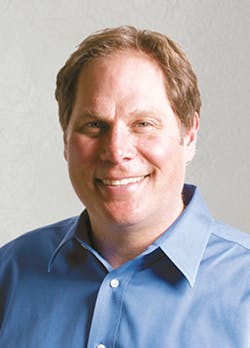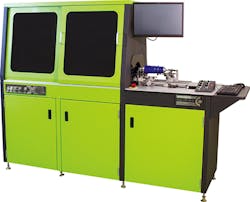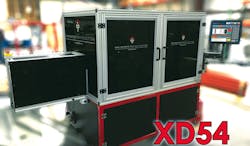Special Report: Inkjet among fastest-growing technologies in decorating
Many experts say digital printing methods such as inkjet and laser marking are experiencing the most significant growth of any marking methods in industrial applications.
Perhaps not surprisingly then, Plastics Machinery Magazine's interviews with companies found many innovations in inkjet printing. The process is lauded for its image quality, color capabilities, functionality within production cells and overall efficiency. Inkjet machines can be set up inline and process high volumes very quickly.
Scott Sabreen is an expert in plastics decorating and the owner of The Sabreen Group Inc., The Colony, Texas. He identified inkjet as one of the fastest growing technologies in decorating plastics.
In part, what's allowing the growth are the custom ink formulations that now adhere to specific substrates. The technology has been around long enough that there are inexpensive versions of equipment that have been developed that make it more cost feasible.
Officials with printer manufacturing companies, including Ben Adner, founder and president of InkCups Now Corp., Danvers, Mass., echo Sabreen's sentiments.
"Over the years, we have put a focus on developing new inks and especially on ink compliance," Adner says. "We spend a great deal of time and money ensuring that all inks we sell are safe, independently lab tested and compliant to primary regulations. We develop hard inks that have excellent adhesion to plastics [and] flexible inks for soft-touch applications like foams and urethanes."
Advances in print-head technologies and software are allowing the inkjet process to go faster. Newer print heads are able to jet ink faster and are also longer, effectively printing more surface area per pass, which can speed up the throughput of a machine dramatically. These heads are piezoelectric, drop-on-demand. The technology uses a special type of pressure pulse in an ink chamber within the print head, which forces ink droplets onto the substrate. Sabreen said that the number of manufacturers has greatly expanded from the two or three companies that originally were in this niche.
"The print head is the single most important driving factor," he says. "Everything else will follow that." Sabreen starts with selecting the print head that is best; once he has that, he custom-develops the ink formulation or works with the company that can provide the ideal ink formulation.
PRINTER MAKERS BRINGINGNEW MODELS TO MARKET
InkCups Now is bringing to market The Helix, an industrial printer that is designed to print single- or multicolor images on straight-walled and tapered cylinders. The machine is particularly suited for drinkware, cosmetics and industrial products. It has a print diameter range of 2 inches to 4.5 inches and cylinder length range of 3 inches to 1 foot. Adner is especially enthusiastic about the machine because it marks his company's foray into designing, building and manufacturing its own machine in the United States.
"Our goal was to get something that was fast enough, not as expensive, and very flexible and easy to use," says Adner.
The Helix can print four parts per minute. One of its key features is the Helical Software that places inkjet droplets in a spiral or helical pattern precisely along the cylinder at an extremely high speed, hence the name of the machine. Adner says that what makes the Helix unique is that it is both fast and flexible and it sells at a competitive price. It is geared around customers who want to print short to medium production runs from one sample piece to 10,000 parts. In the market, there are slower machines for cylinders (one part per minute) and very expensive, faster machines that print eight parts or more per minute.
"The Helix is designed to a happy medium — fast enough to handle production volumes and very easy to change over between all different cylinder types," Adner says.
Scott Einsig, director of business development at Engineered Printing Solutions (EPS) in East Dorset, Vt., is excited about his company's machines, including its XD54, which the company launched at the Specialty Graphic Imaging Association (SGIA) Expo in November.
This single-pass inkjet printer is EPS' "out-of-the-box" option for printing on industrial products, Einsig says, and is built upon EPS' experience in supplying custom machines. For most applications, a custom machine would be required. The XD54 has a few modular components for a semi-custom option, but the goal was to give users an option for higher throughput and better resolution without investing in all of the research and development that can come with a completely custom machine.
The model pictured with this story is set up to print bottle caps up to 2 inches wide with cyan, magenta, yellow, black and white, says Einsig. The machine helps meet the demand for mass customization, personalization and the need for consumers to feel as if they are able to "interact" with product packaging. One of EPS' injection molding customers is a large firm that needed assistance when it had a change in production requirements. The molder's market had shifted toward multicolor images with shorter print runs on the same series of molded parts. EPS worked with the molder to shift from a technology for single-color images that required at least 30 to 45 minutes for job changeovers. With the new inkjet technology, the molder achieved the same throughput, making multicolor images that cured immediately with less ink waste. The molder can now perform changeovers in seconds and enter orders remotely, using its own software.
"A huge market for us is injection molding companies that previously had outsourced a lot of this decoration," Einsig says. "It is a value-added incentive for them to invest."
Tosh Srl, a Milan company that has specialized in pad printing, will release its first digital, drop-on-demand inkjet printer to the market this year, says John Kaverman, owner and president of Pad Print Pros LLC, Onsted, Mich., which is an independent sales and consulting firm that specializes in pad printing and digital thermal transfer marking. Tosh machinery and equipment is sold through Innovative Marking Systems Inc., Lowell, Mass., which is its exclusive U.S. distributor. The machine will be a single-pass unit for cylindrical parts that will include packaging for cosmetics and bottles that are blow molded. Single pass allows several colors to be dispensed at the same time.
"They're not looking at flatbed, only looking at single pass for cylindrical parts," Kaverman says. "They are going after a very specific part of the market."
The machines are in beta testing now in France and Italy. They will be able to print several tens of thousands of parts per hour, Kaverman says.
Mimaki USA, Suwanee, Ga., introduced its UJF-7151 plus flatbed inkjet printer during SGIA, and the product won the SGIA Product of the Year for a small flatbed printer for industrial and small item decoration. This is the next generation of the UJF series and is designed for sign, specialty graphics and award and personalization companies to realize the benefits of digital printing with higher margins and lower production costs. It has six print heads in a staggered design that allows for faster print speeds of up to 35.5 square feet per hour. The company says that the machine is ideal for screen printers and pad printing shops that want to add one-off or custom digital print operations. Three types of ink are available: "hard" inks that are chemical- and abrasion-resistant; inks that are flexible for use in banners and vehicle wraps; and pliable yet stable inks for thermoforming applications.
Angie DeRosa, managing editor
Contact:
Engineered Printing Solutions, 802-362-0844, www.epsvt.com
InkCups Now Corp., 978-646-8980, www.inkcupsnow.com
Innovative Marking Systems, 978-459-6533, www.padprinters.com
Mimaki USA, 678-730-0170, www.mimakiusa.com
Sabreen Group Inc., 972-820-6777, www.sabreen.com



